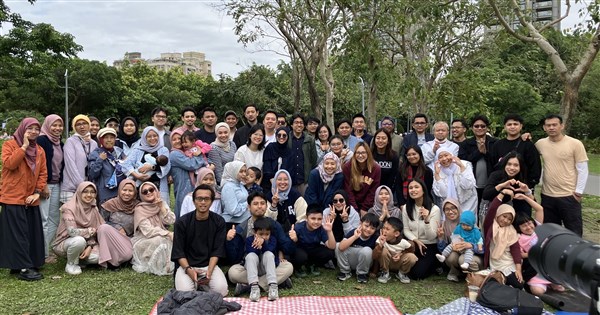Taipei, April 13 (CNA) A large number of predominantly Indonesian Muslims gathered in the Daan Forest Park in Taipei Sunday for the annual Eid al-Fitr event held by the Taipei City government, marking the occasion with Halal food, music and culture.
Ria, an attendee from Indonesia, told CNA that she learned about the event online and was excited to visit the Halal food stands at a bazaar set up for the occasion, especially those offering Indonesian food, which she missed.
A public health PhD student at National Yang Ming Chiao Tung University’s (NYCU) Taipei campus, Ria praised Taiwan for being Muslim friendly, citing Family Mart’s designated sections for Halal-certified food at its stores, as well Taiwan’s abundance of Halal restaurants and prayer rooms.
On her campus, where the number of Muslim students is on the rise, there is a prayer room that Muslim students use frequently, Ria said, remembering how “accommodating” NYCU struck her when she enrolled at the school.
Meanwhile, on a nearby lawn, a few dozen young Indonesians were picnicking and dancing to music from their home country.
One of the group, Nobel, said he and his friends were students at National Taiwan University, which currently has around 400 Indonesian students.
Restu, another member of the group, said she and her friends met on Sunday to give forgiveness to one another for any mistakes they may have made over the past year – a practice known as “halal-bihalal” that Indonesian Muslims typically engage in during the month following Ramadan, the holy month of fasting.
Usually, halal-bihalal is practiced among close relatives, but since they are far from home, they have honored this tradition among friends for the fourth year at the city government’s Eid al-Fitr event Sunday, Restu said.
Aside from stands selling food and drinks, the city government also invited Taiwanese and Indonesians to set up stands that juxtaposed Taiwanese and Indonesian cultures.
These included stands displaying handmade Indonesian masks and shadow and string puppets placed side-by-side with a stand introducing Pat ka-tsiòng, or “the eight infernal generals,” a traditional Taiwanese religious dance believed to rid the human realm of pandemics, demons, and evil spirits.
Meanwhile, Gema Angklung, a band that features a traditional Indonesian percussion instrument known as Angklung, performed an instrumental rendition of “Tian Mi Mi” (甜蜜蜜) by late Taiwanese songstress Teresa Teng (鄧麗君).
One staffer from the Taipei City Foreign and Disabled Labor Office, which organized the cultural events, said these activities were meant to promote mutual understanding between Taiwanese and Indonesians.
Taipei Mayor Chiang Wan-an (蔣萬安) appeared at the event and gave a speech, during which he thanked the Muslims for choosing to live and work in Taipei.
“Taipei is a passionate, friendly, inclusive and diverse city where people treat members of all ethnic groups as family, regardless of who arrived first,” Chiang said.
Indonesia’s representative to Taiwan Arif Sulistiyo said there were around 35,000 Indonesians in Taipei, over 90 percent of whom are Muslims.
Arif said he was moved to see some Indonesian caregivers attending Sunday’s event with the seniors under their care, promising to continue working with the Taipei City government to hold what he described as the largest Eid event in Taiwan.
